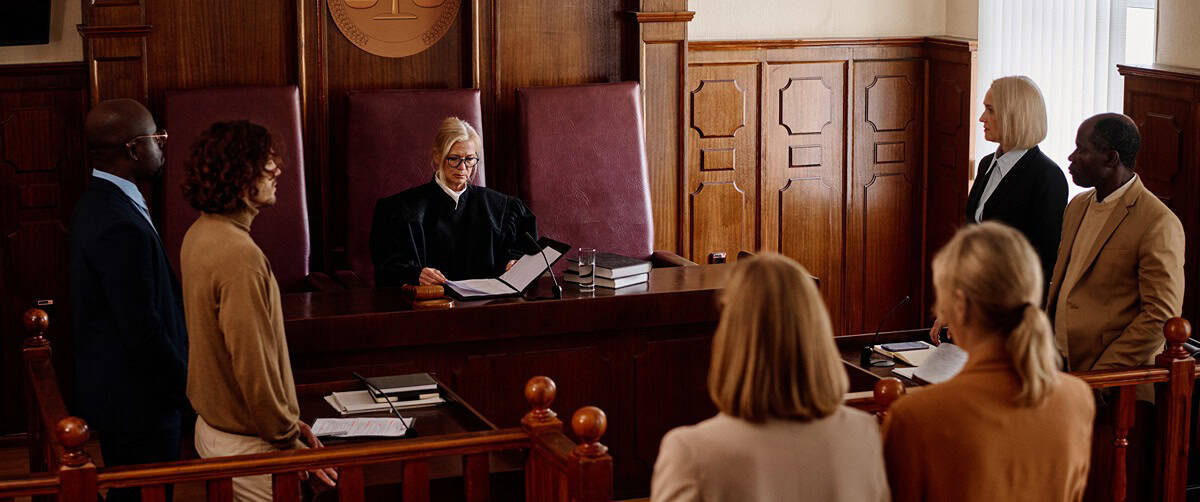Listen To This Page:
Quick Navigation:
- What Is Interference with Judicial Proceedings in Arizona?
- Misdemeanor vs. Felony Interference Under ARS 13-2810
- Related Offenses Under Arizona Law
- Penalties for Interfering with Judicial Proceedings
- Legal Defenses for Felony Interference Charges
- Real-World Examples of Felony Judicial Interference
- FAQs About Interference with Judicial Proceedings in Arizona
- Important Things to Remember About ARS 13-2810 Charges
- Contact a Criminal Defense Attorney From CHM Law
When someone is charged with interference with judicial proceedings in Arizona, they often have no idea how serious the consequences can become—especially when the charge is filed as a felony. These cases typically involve allegations of violating a court order, refusing to comply with a legal subpoena, or disrupting courtroom activities. What may begin as a simple misunderstanding can quickly escalate into a criminal offense under Arizona law, particularly if the court believes the interference was deliberate and part of a larger criminal matter.
Under ARS 13-2810, interference with judicial proceedings can be charged as a misdemeanor or a felony depending on the nature of the underlying conduct. When the interference involves criminal court orders, protection orders, or actions that obstruct justice in a felony case, prosecutors may file felony charges. The consequences of a felony conviction include prison time, probation, and a permanent mark on your record that can affect employment, housing, and more.
This article explains how Arizona law defines this offense, outlines the difference between misdemeanor and felony charges, explores related statutes, and discusses what penalties may apply. Most importantly, it explains how a defense attorney from CHM Law can help you fight these charges and protect your future.
Get Immediate Help from Our Criminal Defense Attorneys.
We are Available to Talk Now.
Or, Continue Reading Below About:
Felony Interference with Judicial Proceedings
What Is Interference with Judicial Proceedings in Arizona?
Arizona Revised Statutes § 13-2810 defines interference with judicial proceedings as the intentional disobedience of, or resistance to, a lawful court order. It is important to note that this statute only applies to misdemeanor charges. Contrary to some public misunderstanding, ARS § 13-2810 is always classified as a Class 1 misdemeanor, and felony charges must come from related but separate statutes.
Conduct that may trigger an ARS § 13-2810 charge includes:
- Willfully disobeying a subpoena
- Refusing to be sworn in or testify
- Violating a court’s lawful order (e.g., restraining or protective orders)
- Disrupting court proceedings or failing to comply with court protocol
Although the statute only authorizes misdemeanor penalties, cases involving more serious interference may also involve felony-level charges under other statutes, such as witness tampering or aggravated harassment.
Misdemeanor vs. Felony Interference Under ARS 13-2810
A.R.S. § 13-2810 is always charged as a Class 1 misdemeanor, regardless of the context in which the interference occurs. The maximum penalties for this offense include:
- Up to 6 months in jail
- Fines up to $2,500 plus surcharges
- Up to 3 years of probation
However, if the conduct includes aggravated behavior—such as threatening a witness, repeatedly violating court orders, or tampering with evidence—the defendant may be separately charged under other statutes that carry felony classifications.
For instance:
- Threatening a witness may be charged under ARS § 13-2802 (Influencing a Witness).
- Violating a protective order with a domestic violence history may trigger ARS § 13-2921.01 (Aggravated Harassment).
These related statutes carry felony-level penalties but are distinct from ARS § 13-2810.
Related Offenses Under Arizona Law
Other Arizona laws often come into play in cases of interference with judicial proceedings. These related statutes may be charged in conjunction or in place of ARS 13-2810:
ARS § 13-2921.01 – Aggravated Harassment
This statute applies when someone violates an order of protection or injunction against harassment and has a prior domestic violence conviction. It is commonly charged as a Class 5 felony.
ARS § 13-2802 – Influencing a Witness
A person may be charged under this law if they threaten, bribe, or otherwise attempt to influence a witness’s testimony. This is a Class 5 felony and can lead to prison if the interference affects a felony case.
ARS § 13-2804 – Tampering with a Witness
This charge applies when someone tries to prevent or delay a witness from appearing in court or giving testimony. It is also a Class 6 felony in most situations.
ARS § 13-2402 – Obstructing Criminal Investigations or Prosecutions
Under this law, it’s illegal to interfere with a criminal investigation or to prevent communication of information to law enforcement. This offense is a Class 1 misdemeanor.
Each of these offenses is treated seriously in Arizona because they threaten the fairness and integrity of the legal process. CHM Law frequently defends clients charged with these offenses and understands how to expose weaknesses in the government’s case.
Penalties for Interfering with Judicial Proceedings
The penalties depend on whether the charge is filed as a misdemeanor or felony, and whether the accused has prior convictions or was on probation or release at the time.
| Offense | Classification | Penalties | Relevant Statute |
| Interference with Judicial Proceedings | Class 1 Misdemeanor | Up to 6 months in jail, $2,500 fine, 3 years probation | ARS § 13-2810 |
| Aggravated Harassment (Violation of Order of Protection with Prior DV Conviction) | Class 5 Felony | 6 months to 2.5 years in prison; longer with aggravating factors | ARS § 13-2921.01 |
| Influencing a Witness | Class 5 Felony | 6 months to 2.5 years in prison; higher with prior felony history | ARS § 13-2802 |
| Tampering with a Witness | Class 6 Felony | 4 months to 2 years in prison; longer with aggravating circumstances | ARS § 13-2804 |
| Obstructing Criminal Investigations or Prosecutions | Class 1 Misdemeanor | Up to 6 months in jail, $2,500 fine, 3 years probation | ARS § 13-2402 |
Legal Defenses for Felony Interference Charges
Facing a felony charge can be stressful, but there are multiple defense strategies that a skilled attorney can use. At CHM Law, we often examine:
1. Lack of Knowledge or Intent
If the accused did not knowingly violate a court order or wasn’t aware their actions interfered with judicial proceedings, the state may not be able to prove the required intent element.
2. Unclear or Improperly Served Court Order
In some cases, the accused may never have received proper notice of the court order or subpoena, which can be a valid defense to the charge.
3. Constitutional Rights Violations
If law enforcement violated your constitutional rights (e.g., unlawful arrest or seizure), evidence may be suppressed, weakening the prosecution’s case.
4. False Accusations or Retaliation
Allegations of interference can arise from disputes in custody cases, domestic situations, or revenge scenarios, especially when orders of protection are involved.
5. Procedural Errors by the Court
Sometimes, the court may issue an order without proper legal authority or fail to follow due process, which can form the basis for a dismissal or reduction of charges.
Real-World Examples of Felony Judicial Interference
Example 1: Violation of Order of Protection
A Phoenix man subject to a domestic violence protection order sent repeated text messages to the protected party, violating the terms of the order. While the messages were not threatening, the repeated violations resulted in a felony aggravated harassment charge under ARS § 13-2921.01 in addition to interference under ARS § 13-2810.
Example 2: Witness Tampering in Felony Theft Case
A woman charged with felony shoplifting in Mesa was accused of pressuring a friend not to testify at her preliminary hearing. Prosecutors filed both witness tampering (ARS § 13-2804) and interference with judicial proceedings as Class 5 felonies, arguing the conduct obstructed justice.
FAQs About Interference with Judicial Proceedings in Arizona
⑴ Can interference with judicial proceedings be charged alone?
Yes, but it’s often accompanied by related charges, especially in felony cases.
⑵ Is violating a restraining order always a felony?
No, a first-time violation is typically a misdemeanor, but repeated violations or violations tied to other crimes can result in felony charges.
⑶ What if I didn’t know I was violating a court order?
Knowledge is an important element. If you weren’t properly notified, that could be a defense.
⑷ Can I go to jail for interfering with a civil court case?
Yes, even in civil cases, disobeying a court order or disrupting proceedings can result in criminal charges.
⑸ Does apologizing to the court help?
It might help during sentencing but usually won’t result in a dismissal unless tied to other legal arguments.
⑹ Can these charges affect a family law case?
Absolutely. Violating a protective order or disrupting court in a divorce or custody case can impact parenting rights and visitation.
Important Things to Remember About ARS 13-2810 Charges
- Interference with judicial proceedings is often charged as a misdemeanor but can escalate to a felony.
- Felony charges typically arise from interfering with criminal cases, protection orders, or witness testimony.
- Other statutes, such as witness tampering or aggravated harassment, often accompany these charges.
- Defenses may include lack of intent, improper notice, or procedural errors.
- Legal representation can make a substantial difference in outcome, especially with felony-level exposure.
Contact a Criminal Defense Attorney From CHM Law
If you’re facing interference with judicial proceedings charges, especially at the felony level, it’s essential to speak with an experienced criminal defense attorney as early as possible. The attorneys at Colburn Hintze Maletta (CHM Law) offer strategic, aggressive representation built on years of experience in Arizona’s criminal courts.
We provide free one-on-one consultations to help you understand your charges and your legal options. Our legal team has built strong relationships with prosecutors, judges, and law enforcement agencies in Maricopa and Pinal Counties. Whether we fight for dismissal, negotiate a plea, or take your case to trial, we are committed to defending your rights and your future.
Call us today at (602) 825-2500 or reach out online through our secure contact form to schedule your free consultation. Let us help you move forward with confidence.

David Maletta is a widely respected criminal defense attorney with over 23 years of experience and has worked on over 1,000 cases and has successfully won over 100 jury trials. David graduated from Northern Arizona University, Magna Cum Laude in 1993 with a degree in Psychology. Shortly thereafter, he earned his Juris Doctor degree from Seton Hall University School of Law in 1998. He has extensive experience in criminal and DUI matters, homicide, sexually-based offenses, domestic violence, white-collar crimes, and various misdemeanor crimes.
Always Available 24/7 for Legal Help
Schedule an Appointment Today!
Call Us Now to Speak with an Attorney (602) 825-2500
Real Client Reviews
Below are just a few of what our clients have to say!









